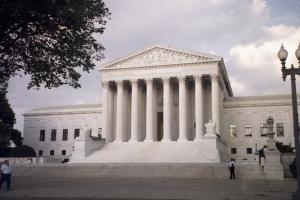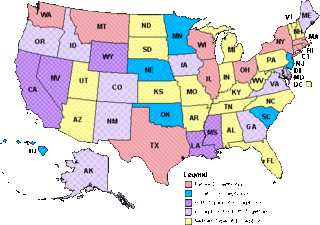In law, a minor is someone under a certain age, usually the age of majority, which demarcates an underage individual from legal adulthood. The age of majority depends upon jurisdiction and application, but it is commonly 18. Minor may also be used in contexts that are unconnected to the overall age of majority. For example, the smoking and drinking age in the United States is 21, and younger people below this age are sometimes called minors in the context of tobacco and alcohol law, even if they are at least 18. The terms underage or minor often refer to those under the age of majority, but may also refer to a person under other legal age limits, such as the age of consent, marriageable age, driving age, voting age, working age, etc. Such age limits are often different from the age of majority.

Legal capacity is a quality denoting either the legal aptitude of a person to have rights and liabilities, or altogether the personhood itself in regard to an entity other than a natural person.
The term in loco parentis, Latin for "in the place of a parent", refers to the legal responsibility of a person or organization to take on some of the functions and responsibilities of a parent.
A legal guardian is a person who has been appointed by a court or otherwise has the legal authority to make decisions relevant to the personal and property interests of another person who is deemed incompetent, called a ward. For example, a legal guardian might be granted the authority to make decisions regarding a ward's housing or medical care or manage the ward's finances. Guardianship is most appropriate when an alleged ward is functionally incapacitated, meaning they have a lagging skill critical to performing certain tasks, such as making important life decisions. Guardianship intends to serve as a safeguard to protect the ward.
Emancipation of minors is a legal mechanism by which a minor before attaining the age of majority is freed from control by their parents or guardians, and the parents or guardians are freed from responsibility for their child. Minors are normally considered legally incompetent to enter into contracts and to handle their own affairs. Emancipation overrides that presumption and allows emancipated children to legally make certain decisions on their own behalf.
Many jurisdictions have laws applying to minors and abortion. These parental involvement laws require that one or more parents consent or be informed before their minor daughter may legally have an abortion.

Homeschooling constitutes the education of about 3.4% of U.S. students as of 2012. The number of homeschoolers in the United States has increased significantly over the past few decades since the end of the 20th century. In the United States, the Supreme Court has ruled that parents have a fundamental right to direct the education of their children. The right to homeschool is not frequently questioned in court, but the amount of state regulation and help that can or should be expected continues to be subject to legal debate.

Although the minimum legal age to purchase alcohol is 21 in all U.S. states and most territories, the legal details for consumption vary greatly. Although some states completely ban alcohol usage for people under 18, the majority have exceptions that permit consumption.

Visitors to the United States must obtain a visa from one of the U.S. diplomatic missions unless they are citizens of one of the visa-exempt or Visa Waiver Program countries.

A Form I-766 employment authorization document or EAD card, known popularly as a work permit, is a document issued by the United States Citizenship and Immigration Services (USCIS) that provides temporary employment authorization to noncitizens in the United States.

Argentine passport are issued to citizens of Argentina by the National Registry for People (ReNaPer). They were issued exclusively by the Argentine Federal Police up to 2011. Their primary use is to facilitate international travel.
A work permit or work visa is the permission to take a job within a foreign country. The foreign country where someone seeks to obtain a work permit for is also known as the "country of work", as opposed to the "country of origin" where someone holds citizenship or nationality.
The constitution of Brunei states that while the official religion is the Shafi'i school of Sunni Islam, all other religions may be practiced "in peace and harmony." Apostasy and blasphemy are legally punishable by corporal and capital punishment, including stoning to death, amputation of hands or feet, or caning. Only caning has been used since 1957.
The M-1 visa is a type of student visa in the U.S. reserved for international students attending vocational schools and technical schools.

U.S. citizens and permanent residents entering Canada by land are required to possess the requisite documentation, such as a passport, driver's license, and other valid identification documents. They must also meet other criteria, such as passing security measures, before they are allowed entry into Canada. Consequently, travelers must also meet the requirements for re-entering the U.S. at the end of their visit.

Gun laws in Oklahoma regulate the sale, possession, and use of firearms and ammunition in the state of Oklahoma in the United States.

Homeschooling is illegal in many countries. Countries with the most prevalent homeschooling movements include Australia, Canada, New Zealand, the United Kingdom, and the United States. Some countries have highly regulated homeschooling programs as an extension of the compulsory school system; few others, such as Germany, have outlawed it entirely. In some other countries, while not restricted by law, homeschooling is not socially acceptable, or is considered undesirable, and is virtually non-existent.
Walī is an Arabic word primarily meaning primarily "ally", from whnce other related meanings with Islamic cultural tones derive, such as "ally of God" or "holy man/saint", etc. "Wali" can also mean a "legal guardian", or ruler; someone who has "Wilayah" over somebody else, and in fiqh is often "an authorized agent of the bride in concluding a marriage contract ",
The Central American Minors (CAM) Refugee and Parole Program is a U.S. refugee and parole program established in November 2014 by the Obama administration. It is a refugee protection and family reunification pathway on which several thousand families rely and for which tens of thousands more families are technically eligible. The CAM Program was designed to permit certain children and other eligible family members to escape life-threatening danger and other humanitarian crises and to reunite with parents or relatives in the United States. This program provides certain qualified parents and legal guardians to apply for their children and other eligible family members, who are nationals of and physically present in El Salvador, Guatemala, and Honduras, to come to the United States as refugees or parolees. The CAM Program has been operational from 2014 to 2017-18 when it was terminated over a series of actions; and from 2021 to the present, when it was restarted in two phases, first for some previously closed cases and then for new applications. To date, most CAM Program beneficiaries have been Salvadoran families of Temporary Protected Status (TPS) holders, making up 86 percent of applicants from the 2014–2017. Since the Biden administration restarted the CAM Program for new applications, the CAM Program has had expanded eligibility criteria, including parents and guardians with pending asylum applications or U visa petitions, which should enable many more Guatemalans and Hondurans to apply.
Privacy in education refers to the broad area of ideologies, practices, and legislation that involve the privacy rights of individuals in the education system. Concepts that are commonly associated with privacy in education include the expectation of privacy, the Family Educational Rights and Privacy Act (FERPA), the Fourth Amendment, and the Health Insurance Portability and Accountability Act of 1996 (HIPAA). Most privacy in education concerns relate to the protection of student data and the privacy of medical records. Many scholars are engaging in an academic discussion that covers the scope of students’ privacy rights, from student in K-12 and even higher education, and the management of student data in an age of rapid access and dissemination of information.







